- The Oral B 3000 vs 5000: Which Electric Toothbrush Is Better? - February 27, 2022
- Kid Tested and Dentist Approved: The Five Best Natural Toothpaste for Kids - February 17, 2022
- Need Orthodontic Treatment, But Not a Fan of Braces? The Five Best Braces Alternatives Available - February 7, 2022
Proper at-home dental care is one of the most important factors for oral health and wellbeing. Not only is cleaning your teeth essential for preventing cavities and plaque build-up, but the type of toothpaste you use can also affect how sensitive your teeth are, the health of your gums, and even prevent bad breath.
Yet, with so many toothpaste products on the market, how do you choose which one is right for you? One of the most popular types of toothpaste on the market right now is charcoal toothpaste. While the name might sound funny, charcoal toothpaste actually makes use of activated charcoal — a type of fine powder made from wood, coconut shells, and other ingredients that are exposed to extreme heat.
Activated charcoal has a number of health benefits, most notably as a poison treatment due to its absorbent properties, but also to treat kidney diseases and lower cholesterol. When used in toothpaste, however, activated charcoal promises to help whiten teeth and get rid of stains.
While studies are still being done to determine exactly how effective activated charcoal is at whitening teeth, charcoal toothpaste also has the benefit of usually being made with natural ingredients. You won’t find that questionable myriad of chemicals used to create traditional toothpaste.
While using charcoal toothpaste can be a curious experience at first, as charcoal toothpaste typically lacks the chemicals that make regular toothpaste foam in the mouth, charcoal toothpaste offers genuine advantages in terms of quality and cleaning.
Here is everything you need to know about the benefits – and the risks — of using charcoal toothpaste, as well as the best options you can buy today to get the best charcoal toothpaste experience possible.
My Bottom Line Up Front: Charcoal toothpaste can be great for removing dental stains and freshening your breath. While it has its own time and place, though, it’s not a product you’re going to want to use every day. Using it too often can actually backfire and be damaging to your teeth. That said, of all the charcoal toothpaste brands that I reviewed, I’d have to say that my personal favorite was Schmidt’s Activated Charcoal Toothpaste. Other great contenders, though, were:
- Hello Oral Care Activated Charcoal Teeth Whitening Toothpaste – A Great, All-Natural Runner-Up!
- Colgate Essential Charcoal Whitening Toothpaste – An Affordable Choice for Charcoal Toothpaste Beginners!
- Crest 3D Whitening Therapy Charcoal Deep Clean Toothpaste
- Dirt Don’t Hurt Tooth Powder with Activated Charcoal
- Cali White Activated Charcoal & Organic Coconut Oil Teeth Whitening Toothpaste
You’ll definitely want to keep reading to learn more about how I narrowed these options down to choose Schmidt’s as my clear winner!
A Brief History of Charcoal Toothpaste
Although activated charcoal seems like a new trend, exploding in popularity and being used in products ranging from beauty products to facial scrubs to toothpaste, it’s actually much older than you might think. Charcoal, as well as other oxidized ingredients, have been used in mouth and tooth products since ancient times.
Hippocrates, an Ancient Greek physician widely hailed as the Father of Western Medicine, prescribed the use of charcoal to treat black gums and bad breath for his contemporaries. Several hundred years later, the Romans continued the tradition of using charcoal to keep their mouths clean, making mouthwash and tooth powder out of charred goat hooves.
Much later on, charcoal dental cream and dental gum were popular in the 1930s as a way to fix bad breath and remove tobacco stains on teeth. Nowadays, charcoal toothpaste is once again popular and thanks to modern medical advances, you won’t find any burnt goat in your toothpaste today! Yet, if you’re thinking of switching to charcoal toothpaste full time, think again.
While charcoal toothpaste has been shown to remove surface stains through highly abrasive properties, this same characteristic will erode away your teeth’s enamel if charcoal toothpaste is overused. Instead, it’s best to alternate between using charcoal toothpaste and regular toothpaste for optimal results.
The Benefits of Using Charcoal Toothpaste
That being said, there are many benefits to using charcoal toothpaste that many people absolutely swear by in helping to create a more attractive and confident smile. Here are the top three reasons why you should consider adding charcoal toothpaste into your everyday dental care routine:
- It gets rid of stains and whitens teeth.
- It helps to remove accumulated plaque.
- It can help freshen your breath.
Gets Rid of Stains and Whitens Teeth
Due to its absorptive and abrasive properties, charcoal toothpaste may be able to break up and remove the layers of stains from the surface of your teeth. These discolorations can arise from everyday actions like eating, smoking, or drinking dark liquids such as coffee. However, by absorbing those stains, charcoal toothpaste can help give your teeth a more attractive, cleaner look and smile.
Removes Accumulated Plaque
Charcoal toothpaste also affects the pH balance of the mouth because of the way activated charcoal binds to acidic molecules in your saliva and on the surface of your teeth. This allows your body to remove acidic molecules from your teeth more easily, which contributes to a decrease in overall plaque creation on the surface of your teeth.
Freshens Breath
Finally, charcoal toothpaste can help relieve bad breath, a condition also known as halitosis. It accomplishes this by absorbing the odor-causing molecules that lead to poor-smelling breath.
By regulating the pH environment of the mouth, activated charcoal can also lead to a healthier microbiome in the mouth. In turn, it can help with eliminating or reducing the presence of certain enzyme-producing bacteria often present in the mouth that can lead to a foul smell.
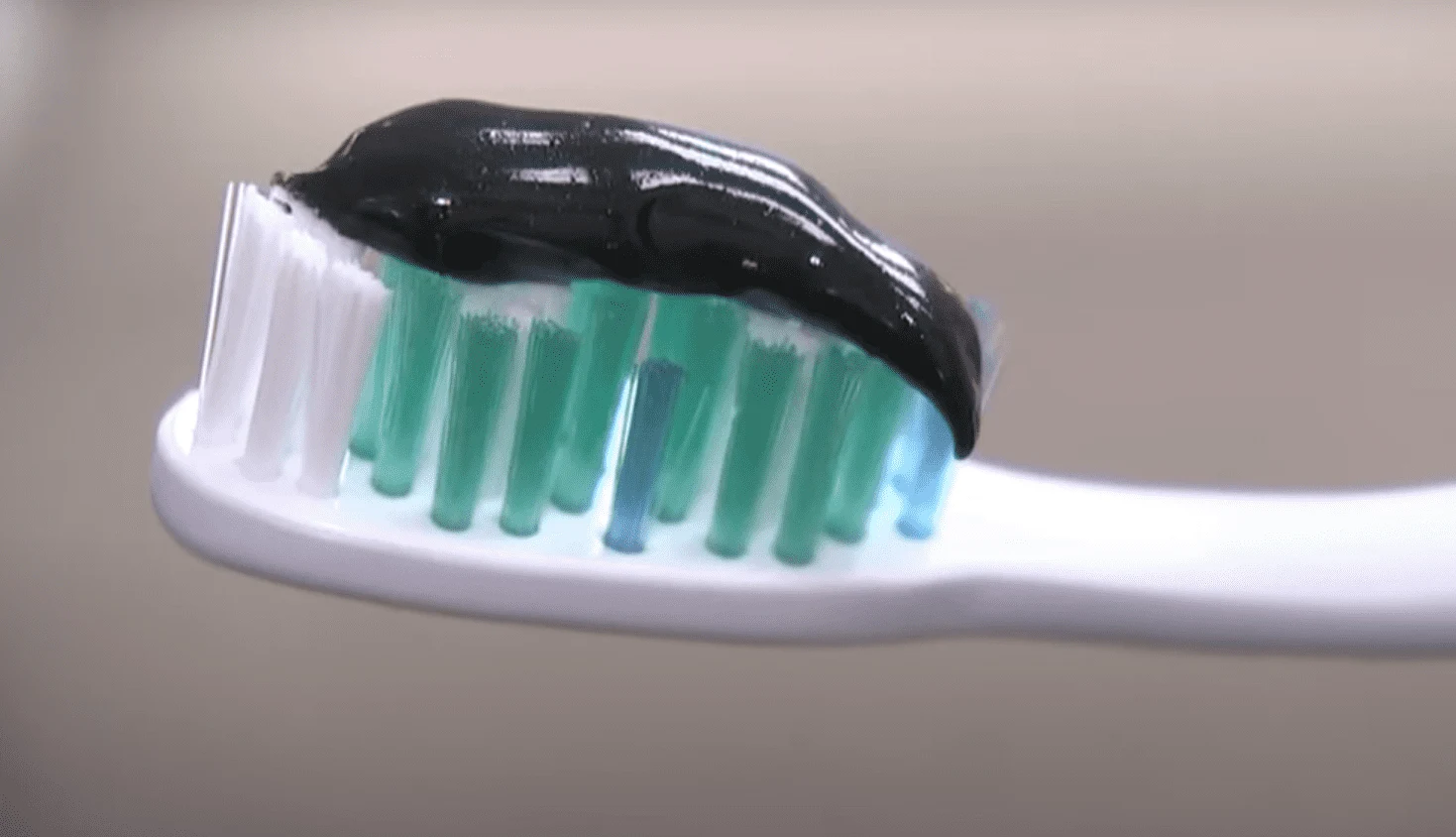
The Main Differences between Charcoal Toothpaste and Regular Toothpaste
There are a number of differences between regular toothpaste and charcoal toothpaste. Although the name may seem like it implies otherwise, charcoal toothpaste cannot actually serve as a complete substitute for regular toothpaste. The two products do different things and should be used together for maximum oral health.
Here are some of the big differences between charcoal toothpaste and regular toothpaste.
- Regular toothpaste is designed to clean and protect your teeth, whereas charcoal toothpaste is for removing plaque buildup and stains.
- Regular toothpaste typically contains a combination of surfactants (foaming agents), fluoride, and other ingredients, whereas charcoal toothpaste has a much different ingredient list and includes – of course – charcoal.
- Regular toothpaste can be used twice or three times per day, whereas charcoal toothpaste should be limited to about twice a week.
They’re Designed to Focus on Different Things
Although they’re both called toothpaste, charcoal toothpaste and regular toothpaste are formulated with different goals in mind. The main purpose of regular toothpaste is to clean and protect your teeth. It does so primarily through the use of the chemical fluoride, which binds with calcium and phosphate in the mouth to form fluorapatite, an incredibly strong material that prevents your teeth from being damaged or decaying.
Meanwhile, charcoal toothpaste does not generally contain nearly as much fluoride as traditional toothpaste. Instead, charcoal toothpaste makes use of activated charcoal to remove stains on the surface of your teeth, strip plaque buildup, and regulate the pH balance of your mouth, all of which contribute to a prettier smile and a more healthy mouth.
They Use Different Ingredients
Aside from the obvious differences, charcoal toothpaste has activated charcoal in it, while regular toothpaste doesn’t. The two types of toothpaste are formulated very differently in other ways, as well.
For instance, charcoal toothpaste tends to make use of more natural ingredients and therefore doesn’t foam up in the same way that regular toothpaste does. However, the lack of fluoride in charcoal toothpaste means that charcoal toothpaste cannot protect your teeth in the same way that traditional toothpaste can.
They Should Be Used Differently
The final difference between charcoal toothpaste and regular toothpaste is the logical consequence of the first two. Since they’re made to accomplish different things using different ingredients, you should be using them in different ways.
Charcoal toothpaste should serve as an addition to your dental care routine, rather than replacing your regular toothpaste. Brush with charcoal toothpaste, after brushing your teeth with your regular toothpaste, about once or twice a week for optimal results.
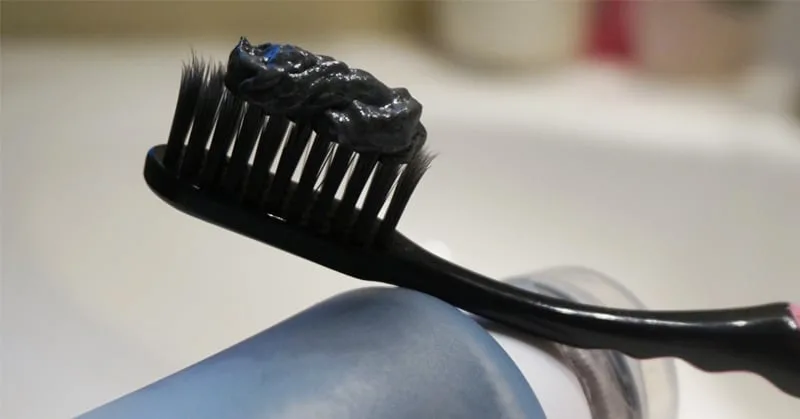
The Six Best Charcoal Toothpastes on the Market Today
As with any product, it can be difficult to choose a charcoal toothpaste that’s right for you. With so many companies making charcoal toothpaste, finding the best one for your specific needs and teeth is challenging. With that in mind, I was very picky about choosing one to include in my list.
My Selection Criteria
Picking the right charcoal toothpaste is especially important since activated charcoal is potentially dangerous if you choose a brand that uses synthetic or other unhealthy sources of charcoal. I’ve listed the criteria I used to curate a list of the best choices for charcoal toothpaste to incorporate into your routine today below. Take a look!
- Effectiveness
- Flavor
- Quality
- And of course… cost!
All of the charcoal toothpaste brands below had to perform outstandingly in at least one of these categories and adequately in the rest to be considered for the list below. When it finally comes time for you to decide which charcoal toothpaste is right for you, however, it’s important to choose an option that suits your needs.
You may want a product that contains fluoride, or one that’s fluoride-free to use in conjunction with your existing toothpaste. Teeth sensitivity may be a concern for you, or you may want to try powder toothpaste. Whatever your personal requirements, chances are there’s a toothpaste that’s right for you below!
Hello Oral Care Activated Charcoal Teeth Whitening Toothpaste
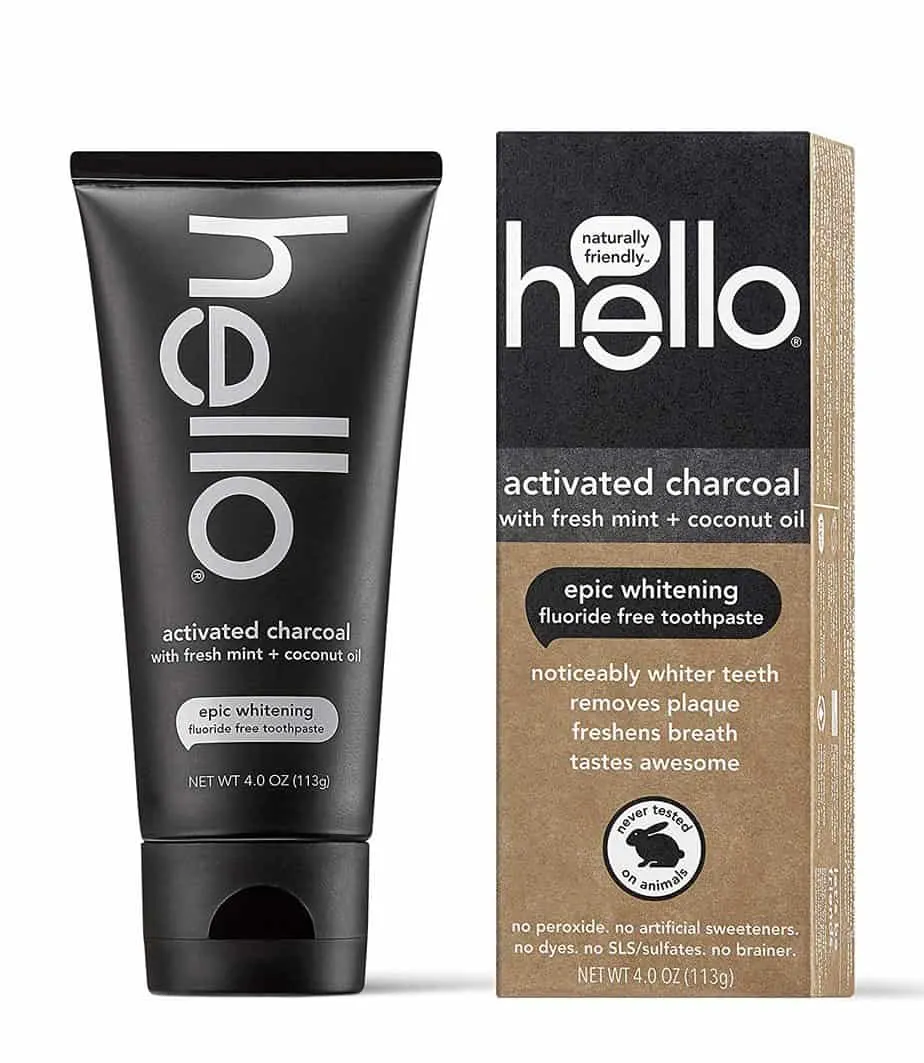
Starting off the list, this charcoal teeth-whitening toothpaste by Hello immediately places itself in the running for being the best charcoal toothpaste, period. With an inky black look, this toothpaste might not make your teeth look very pretty while you’re using it.
However, after a week or so of use, many fans of this toothpaste have reported an enormous improvement in teeth whiteness. Hello makes their charcoal toothpaste using activated charcoal derived from sustainable bamboo. They also forego the artificial flavoring agents, preservatives, sulfates, and dyes that are often present in other toothpaste products.
The toothpaste is also fluoride-free, possibly requiring use together with regular toothpaste. That said, Hello adds erythritol and xylitol to their toothpaste, anti-bacterial agents designed to protect your teeth. A refreshing combination of mint, spearmint, and peppermint essential oils gives Hello’s Oral Care Activated Charcoal Teeth Whitening Toothpaste a familiar and pleasant taste while brushing.
Combined with the absorptive properties of activated charcoal and the coconut oil also present in the toothpaste, it should leave your breath smelling wonderful. The toothpaste is also designed to be less abrasive compared to other charcoal toothpaste.
Pros
- All-natural ingredients
- No harsh surfactants, parabens, or dyes
- Very affordable for such a quality ingredient list
- Can help brighten your teeth
Cons
- Doesn’t contain fluoride
- Doesn’t foam
- Reviews state that it’s messy to use
Colgate Essential Charcoal Whitening Toothpaste
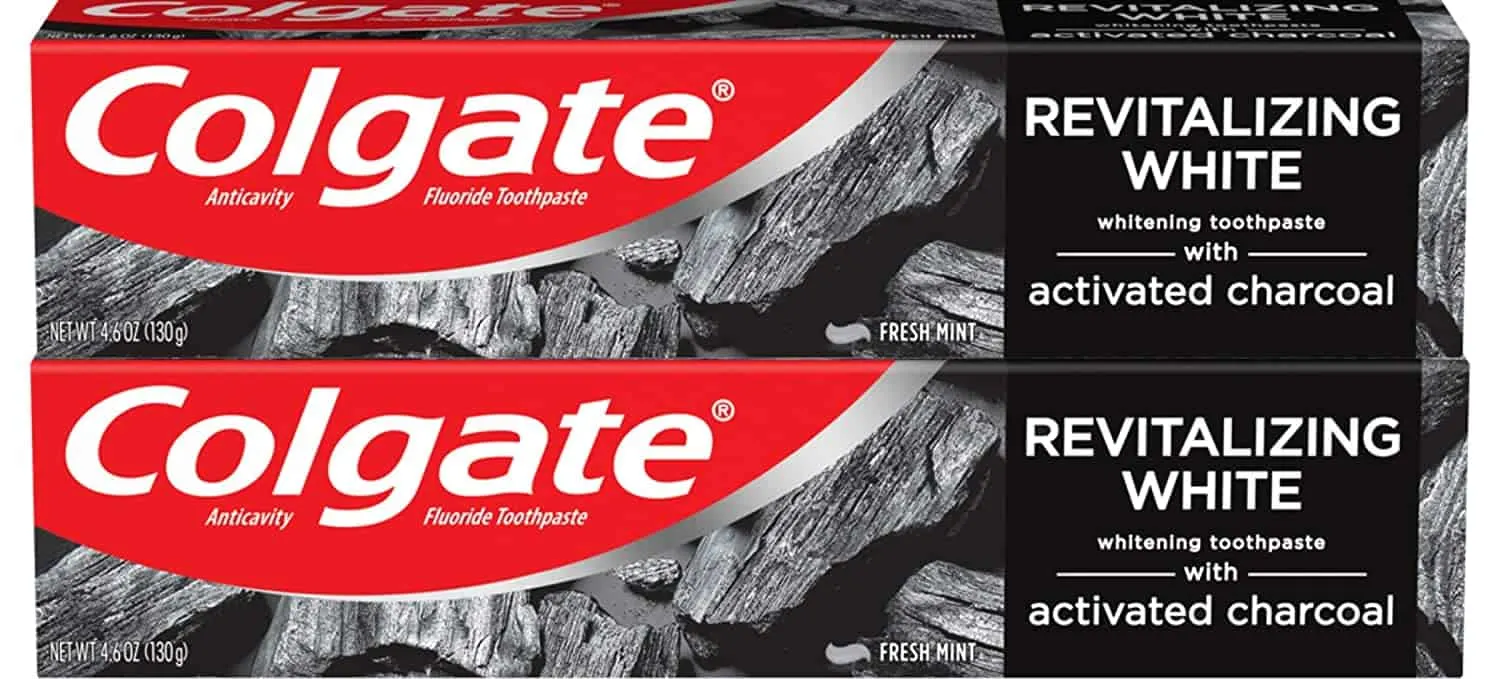
For those of you who might be a little intimidated by the pitch-black color of Hello’s toothpaste, or who just want to keep their dental products at a reasonable price, Colgate’s Essential Charcoal Whitening Toothpaste is a great option. It provides a way to try adding activated charcoal into your daily routine in an inexpensive and inoffensive way.
Colgate’s charcoal toothpaste comes in a much more conventional light gray color, only slightly darker than a typical tube of white Colgate toothpaste. Plus, it can be found readily accessible in drug stores and other common retailers for a surprisingly affordable price, often much less expensive than some other options on this list.
Just like any other Colgate toothpaste, the company’s activated charcoal option contains fluoride and micro-cleaning crystals to protect and clean your teeth. That way, you should be able to use this toothpaste as your only product so long as tooth sensitivity isn’t a concern.
However, for those looking for natural toothpaste, you won’t find that here. Colgate’s charcoal toothpaste uses the same synthetic foaming ingredients as its other offerings. Still, for a tube of charcoal toothpaste, it’s hard to beat the price and convenience of good ol’ Colgate.
Pros
- Good foam and lather
- Very affordable price point
- Less offensive color
- Helps whiten and brighten teeth
Cons
- Contains sulfates (a harsh surfactant)
- Somewhat watery texture
- Some reviews cited an unpleasant flavor
Crest 3D Whitening Therapy Charcoal Deep Clean Toothpaste
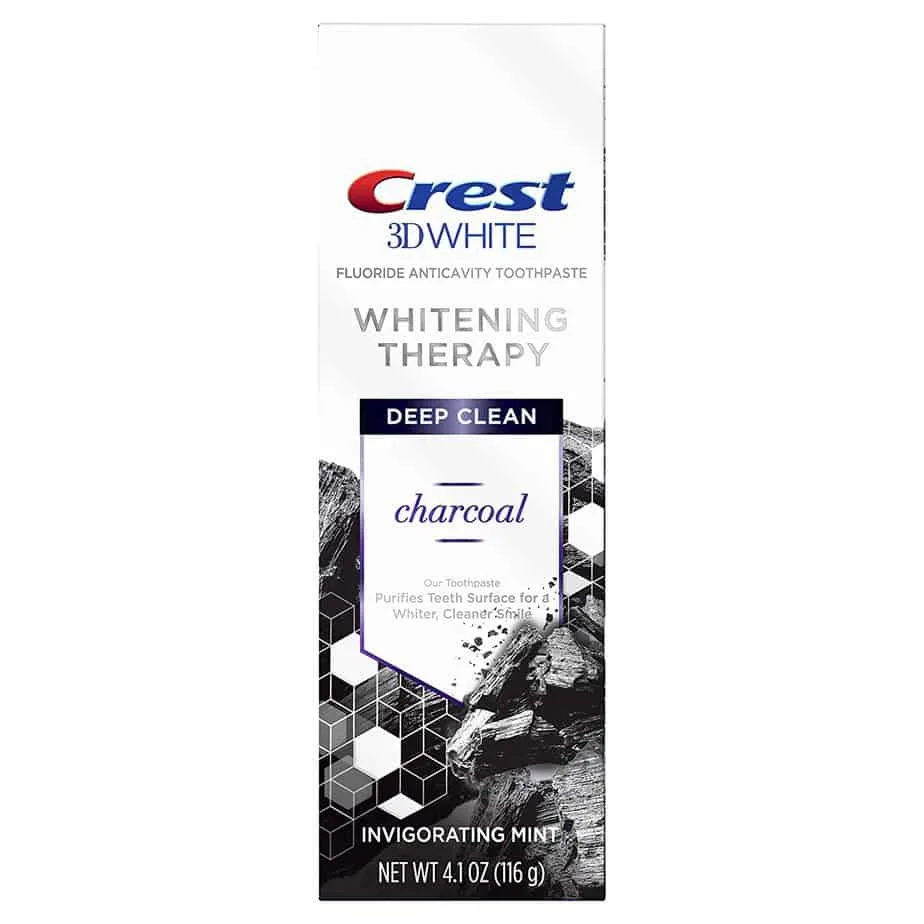
Crest is a well-known name in the world of dental products for their famous teeth-whitening products, such as Crest 3D Whitestrips. It should come as no surprise then, that the company’s foray into teeth-whitening charcoal toothpaste is a big success, as well!
Another good option for anyone scared to try the pure-black versions of charcoal toothpaste, this toothpaste comes with the familiar stripe of color found in Crest’s other products. Activated charcoal, coconut oil, and the typical industry-secret blend of “micro-cleansing whiteners” found in Crest 3D Whitening products all work together in this affordable and high-quality toothpaste.
These ingredients can help to subtly shine and whiten teeth over time. Much like Colgate’s toothpaste, the inclusion of fluoride in Crest’s charcoal toothpaste means that you can use it without having to use another fluoride toothpaste. The highlight for this toothpaste, though, is undoubtedly the effectiveness of the whitening.
Activated charcoal combined with Crest’s already award-winning teeth-whitening formula is a recipe for success. And as an added bonus, the toothpaste tastes practically exactly like any other Crest-brand toothpaste, without the strange taste that some people attribute to more natural charcoal toothpaste brands.
Pros
- Can gently remove stains from teeth
- Pleasant minty flavor
- Not as messy to use, thanks to subtle color
Cons
- Somewhat on the expensive side
- Not as effective on deeper stains
Dirt Don’t Hurt Tooth Powder with Activated Charcoal
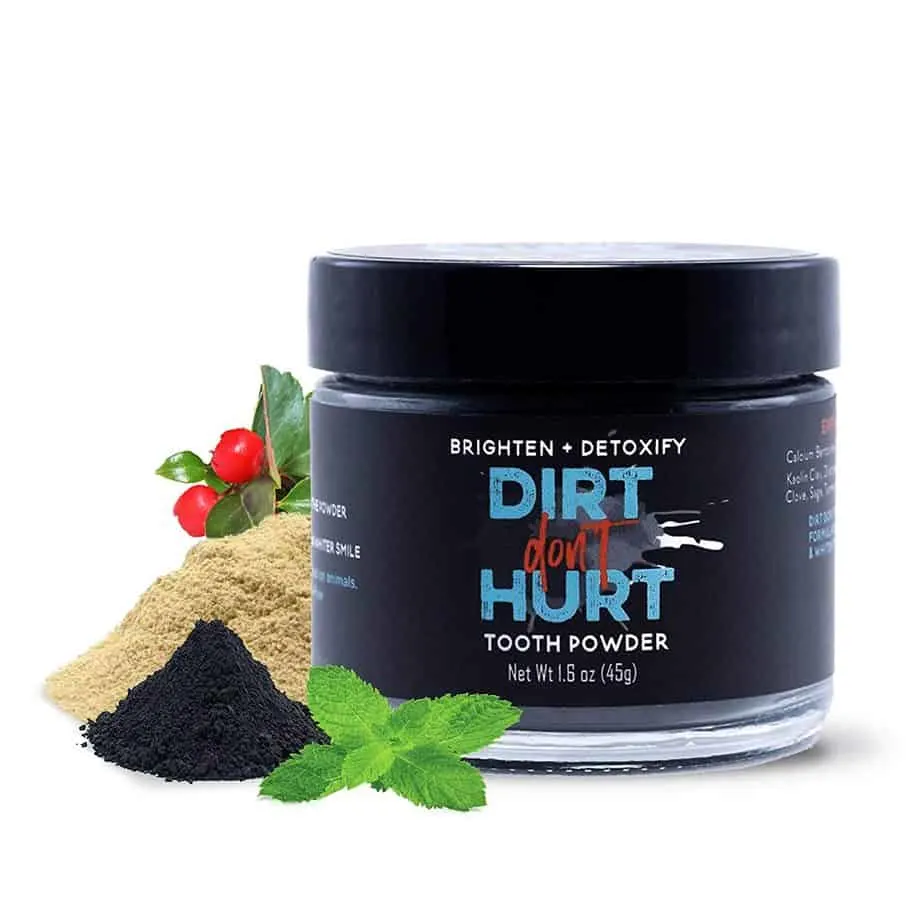
Taking a break from the conventional, tooth powders have gained popularity as an alternative to toothpaste in recent years. This is largely due to the absence of artificial sulfates and other chemicals that companies use to create traditional foaming toothpaste.
Dirt Don’t Hurt’s charcoal tooth powder is no exception, with a one hundred percent natural, vegan and cruelty-free formula. It’s made using coconut oil, bentonite clay, sage, turmeric, wintergreen, spearmint, peppermint, and of course, activated charcoal.
To use the tooth powder, simply wet your toothbrush in some water before dipping it in the powder and brush like normal. While it’s a bit messy due to being a black powder, and the texture might take some getting used to, it isn’t an experience that’s all too different from using regular toothpaste.
This tooth powder appears to have an observable whitening effect when used over time, though you’ll definitely want to use regular toothpaste in addition to this activated charcoal tooth powder. That’s because you’re not going to find any fluoride or other protective ingredients in the powder.
While a little on the pricey side, each jar of this all-natural tooth powder is designed to last you at least six months. You can probably stretch that out even further if you use the powder once every two to three days.
Pros
- All-natural, cruelty-free formula
- Pleasant peppermint flavor
- Gently removes surface stains
Cons
- There’s a learning curve to use
- Very expensive
Cali White Activated Charcoal & Organic Coconut Oil Teeth Whitening Toothpaste
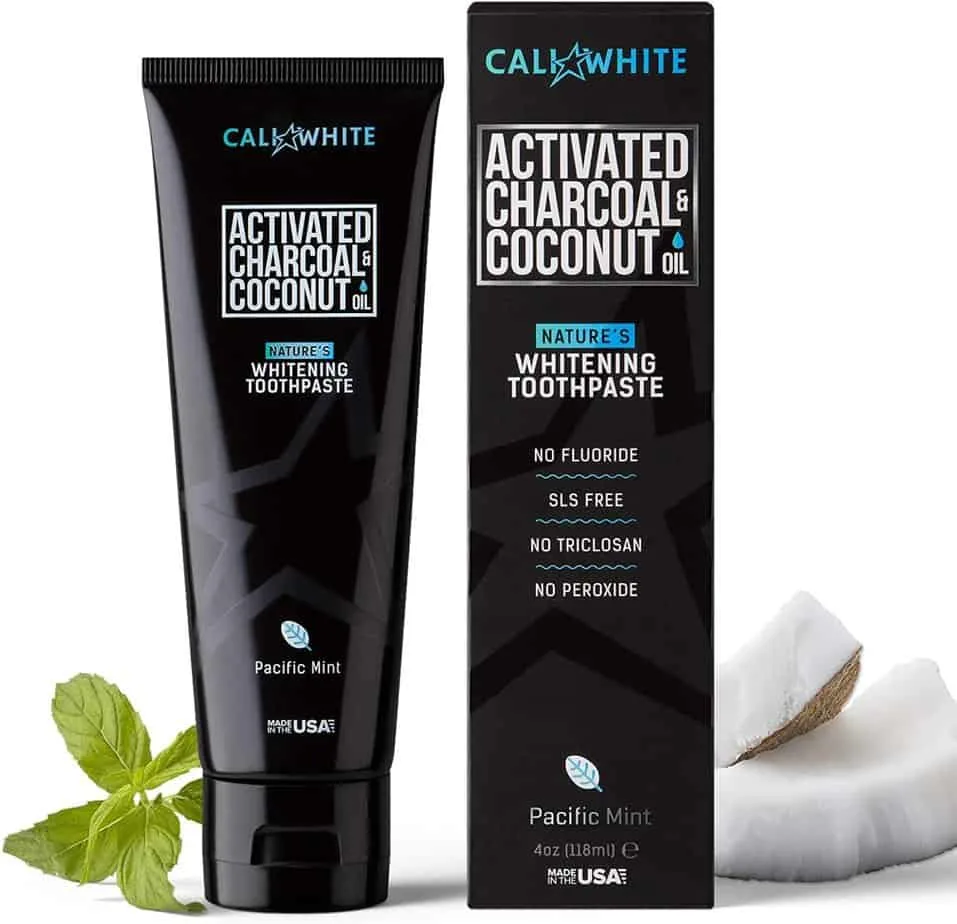
Charcoal toothpaste tends to be a bad idea for individuals with sensitive teeth, as the abrasion of activated charcoal and other ingredients in charcoal toothpaste can result in irritation and pain. That’s not so with Cali White’s Activated Charcoal Toothpaste, however.
Specifically designed to alleviate and accommodate sensitive teeth, this charcoal toothpaste made of entirely vegan ingredients is the best choice for people with tooth sensitivity. It’s also a great choice for its all-natural products, avoiding synthetic chemical irritants such as triclosan and peroxide.
Tooth whitening is accomplished using baking soda in addition to activated charcoal. That said, the company does a good job masking the slightly acrid taste or texture that a lot of toothpaste brands that use baking soda have.
Fans of this toothpaste report definite whiter teeth and better breath after just a few weeks of use! It’s important to keep in mind that this is a fluoride-free toothpaste, though, so you may need to use regular toothpaste together with this charcoal toothpaste to ensure maximum protection of your teeth.
If you have sensitive teeth, ask your dentist about this product before trying it. Even though it’s less irritating than most other charcoal toothpaste brands, activated charcoal is still inherently potentially irritating for individuals with tooth sensitivity.
Pros
- Great for people with sensitive teeth
- Boasts an all-natural, vegan formula
- Clinically proven to whiten your teeth
Cons
- Doesn’t contain fluoride
- Somewhat on the expensive side
- Reviews state that it’s very abrasive
Schmidt’s Activated Charcoal Toothpaste
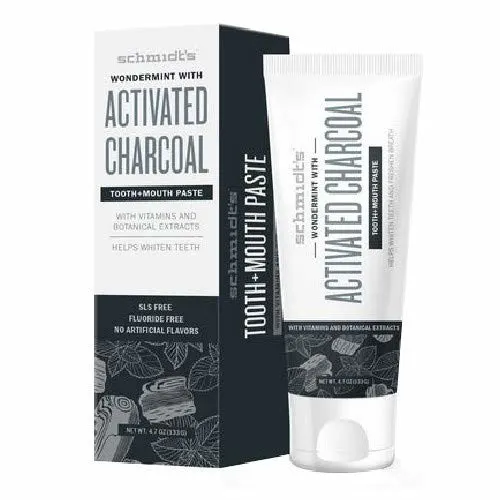
Finally, Schmidt’s Activated Charcoal Toothpaste offers a competitive option for individuals who really want a high-quality and natural dental product to use with their teeth. Schmidt’s charcoal toothpaste is made using various botanicals, including goji berries, pomegranates, aloe leaf juice, magnolia bark extract, and sunflower-derived vitamin E.
This brand is pleased to offer a range of vitamins for your teeth without the synthetic chemicals used by rival toothpaste companies. The toothpaste is also a lovely onyx gray color, which makes it less messy and perhaps less intimidating to use for the charcoal-uninitiated.
Users report better breath and whiter teeth over time when using this toothpaste as well, thanks to its ingredient list. It includes a highly effective mix of activated charcoal and CoQ10, a special natural enzyme that promotes cell growth and maintenance commonly found in beauty and skincare products.
I personally love the taste of this toothpaste, using mint essential oils to create a delicious fresh flavor with just a hint of bitterness. This toothpaste is fluoride-free, so like others on this list, the same warning applies.
You may need to use this toothpaste with other regular toothpaste brands containing fluoride for maximum teeth protection. Fortunately, this toothpaste helps your mouth feel refreshed enough that – at least for me – it’s definitely worth the extra hassle.
Pros
- Can help brighten and whiten your teeth
- Very affordable price
- Pleasant “Wondermint” flavor
- Gets rid of bad breath
Cons
- Can be harsh on very sensitive teeth
- Doesn’t contain fluoride
My Best Use Tips
Like I’ve said, activated toothpaste comes with a variety of benefits, but also carries some risks due to the nature of activated charcoal. Here are some considerations before you pick out a charcoal toothpaste, as well as some best use tips to help you navigate them.
1. Consider using charcoal toothpaste in addition to another toothpaste.
I’ve mentioned this a couple of times already, but you must consider whether or not you need to use another fluoride toothpaste if you choose to use charcoal toothpaste without fluoride. Fluoride plays a crucial role in protecting your teeth, but using a second conventional toothpaste may not actually be vital depending on your individual circumstances.
Many cities actually require the local water supply to include fluoride in the local tap water in order to promote dental health. If you happen to live in one such city, some dentists believe that your teeth will probably be exposed to enough fluoride in the water supply that you can just use charcoal toothpaste without many worries.
However, if you eat lots of sugary or acidic foods that wear down your teeth’s enamel, it may still be a good idea to use fluoride toothpaste together with your charcoal toothpaste. That way, you can be confident that you’re taking great care of your teeth.
2. Don’t overuse charcoal toothpaste. Be sure to take breaks in between.
Another reason you might want to consider using conventional toothpaste in addition to your charcoal toothpaste is the abrasiveness of charcoal toothpaste. While the abrasion caused by activated charcoal is one of the reasons why it’s so good at removing stains on your teeth, activated charcoal can also wear down the enamel on your teeth.
And once the enamel layer on your teeth is worn down, there is no natural way to regenerate it. This consideration has to do with the concentration of charcoal in the toothpaste you’re using, as well as the type of charcoal toothpaste you’re using.
Toothpaste brands with a higher concentration of activated charcoal should not be used every day consecutively, as well. Consider using conventional toothpaste every other day, even if you’re not using both kinds of toothpaste on one day. Additionally, charcoal tooth powders tend to be more abrasive than charcoal toothpaste.
3. Ask your dentist to make sure charcoal toothpaste is right for you.
You should also confirm with your dentist or dental care professional that your teeth are suitable for using charcoal toothpaste. Some individuals with thin enamel layers or highly sensitive teeth should avoid charcoal toothpaste, as the abrasiveness of activated charcoal can further wear down your teeth’s enamel or cause pain and discomfort.
As with all medical products, consult a health professional first before changing your daily healthcare routine. You can ask your dentist about specific brands or types of charcoal toothpaste to figure out what is the best option for your specific use case and circumstances. Chances are that they’ll be more than happy to help you with specific advice on how you can improve your dental and oral health, so don’t be afraid to reach out!
4. Decide what style of charcoal toothpaste you want to use.
Finally, you should decide what type of charcoal toothpaste you want to use. Some charcoal toothpaste brands simply incorporate activated charcoal into conventional toothpaste formulas that you can use as ordinary toothpaste. These toothpaste brands tend to be made by larger companies and are a lot more beginner-friendly.
On the downside, they can also contain tons of synthetic ingredients and may not have as pronounced an effect as more concentrated versions of charcoal toothpaste. Smaller and local companies often make charcoal toothpaste with much higher concentrations of activated charcoal, source natural ingredients, and avoid the chemicals that larger toothpaste brands add to the manufacturing process.
These toothpaste brands tend to be a bit more expensive and may look a little scary and cause a bit of a mess due to the dark black color, but they may also provide the benefits of charcoal toothpaste more effectively than big-brand toothpaste brands. Always make sure you purchase dental products from a reputable source for your own health and safety, however.

Frequently Asked Questions
Answer: Charcoal toothpaste is completely safe, as long as you use it responsibly. While activated charcoal is non-toxic and non-carcinogenic, charcoal can wear down the enamel of your teeth, resulting in a higher chance of developing cavities and potentially greater tooth sensitivity.
You should be careful about using charcoal toothpaste where the activated charcoal is highly concentrated. Consider using charcoal toothpaste at a lower frequency than you would regular toothpaste.
Answer: That depends on how concentrated the activated charcoal in your charcoal toothpaste is, as well as how healthy your teeth are, to begin with. Individuals with a thin enamel layer on their teeth should probably avoid using charcoal toothpaste altogether, or use a less concentrated charcoal toothpaste brand, such as those made by Crest and Colgate.
Even if you have a healthy layer of enamel, charcoal toothpaste should be used for teeth whitening every other day at most. Less concentrated charcoal toothpaste brands can be used with greater frequency.
Answer: A lot of users of charcoal toothpaste report finding that their teeth look noticeably more white after using charcoal toothpaste for a few weeks. However, it’s important to note that activated charcoal is only able to absorb and remove external stains on the surface of your teeth.
Other methods of teeth-whitening are necessary to remove stains underneath the surface of your teeth, such as a professional tooth whitening procedure. More research is also necessary to establish exactly how effective activated charcoal is at removing stains.
Answer: While some brands of charcoal toothpaste may look extremely dark in color and may appear as though they’re staining your teeth while you brush, charcoal toothpaste does not stain your teeth. It will quickly wash away by rinsing the mouth with water. However, charcoal toothpaste may stain your clothes, so be careful while brushing to avoid dripping on your clothes or other belongings.
Answer: Activated charcoal has a natural ability to absorb impurities in your mouth, including the bacteria and plaque that build up on your teeth. However, the absorptive properties of activated charcoal in toothpaste have only been studied through observational means. More research is required to determine exactly how effective charcoal toothpaste is at cleaning teeth compared to conventional types of toothpaste.
Answer: Activated charcoal has been observed to absorb a wide range of impurities in the body when ingested, including:
• Toxins
• Drugs
• Viruses
• Bacteria
• Fungi
• Water-Soluble Chemicals
Some evidence also exists that activated charcoal is able to absorb plaque and foul odors in the mouth. However, more empirical research is necessary to establish exactly how effective activated charcoal is at absorbing impurities when incorporated in toothpaste.
My Final Thoughts
Charcoal toothpaste, while remaining a relatively new phenomenon, seems to be a fantastic way to cheaply and conveniently whiten your teeth and improve your dental health over the long term. Not only does activated charcoal seem to whiten teeth, but charcoal toothpaste also has a measurable effect on regulating the pH level of the mouth. It can help to reduce the activity of bacteria and remove plaque.
After trying out various kinds of charcoal toothpaste, I can say that charcoal toothpaste really helps me to feel more confident about how my teeth look. My favorite of the list above has got to be Schmidt’s Activated Charcoal Toothpaste for its quality ingredients and flavor.
If you want to try to help improve your dental health, whiten your teeth and get rid of any bad breath, charcoal toothpaste is a fantastic and cost-effective means to do so! Most charcoal toothpaste brands are free of fluoride, so you can even safely have your child try out charcoal toothpaste without worrying about them swallowing excessive amounts of fluoride.
However, as with all medical products, make sure you check with your dentist or dental healthcare provider to ensure that charcoal toothpaste is right for you. By using charcoal toothpaste regularly, you could be well on your way to a brighter, more confident smile in just a few short weeks!
Looking for More interesting readings? Check out:


